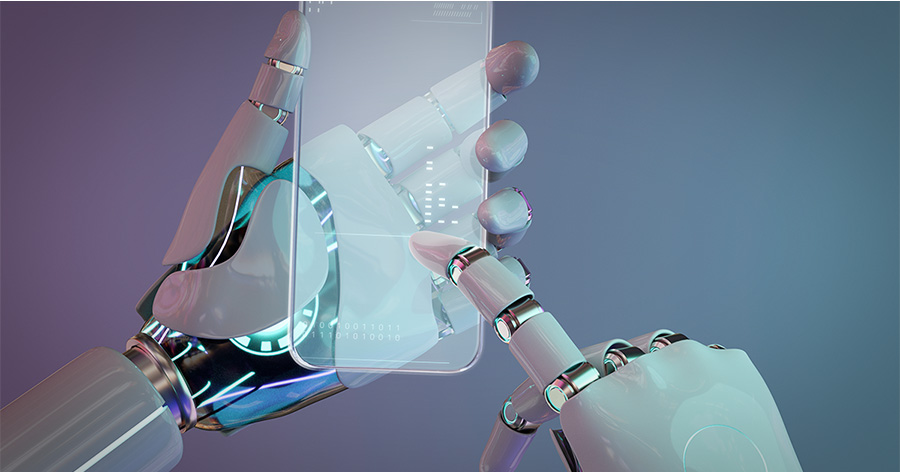
January 2025
The Impact of Artificial Intelligence on Application Development in 2025

In 2025, the influence of AI on application development is more evident than ever. Advances in areas such as deep learning, natural language processing (NLP), and explainable artificial intelligence are enabling the creation of smarter, more transparent, and ethically responsible applications. These developments not only simplify developers' lives by automating repetitive processes and optimizing resources but also empower companies to offer more effective, user-focused solutions.
However, this technological progress also comes with significant challenges. Issues such as privacy, data security, and integrating AI-based systems into existing infrastructures are critical concerns that require continuous attention. Additionally, the rapid pace of technological advancements forces companies to adapt quickly to remain competitive in an ever-evolving market.
This article delves into the impact of AI on application development, exploring the latest advancements, practical applications revolutionizing the industry, and the challenges developers and organizations face. By understanding these dynamics, we can envision a future where artificial intelligence is not just a tool but an indispensable partner for innovation.

Recent Advances in Artificial Intelligence
Advanced Machine Learning: Improvements in deep learning models and natural language processing (NLP) techniques are enabling smarter and more context-aware applications. For instance, in the realm of mobile apps, NLP has revolutionized how virtual assistants like Siri or Google Assistant understand and respond to voice commands in multiple languages. Similarly, advanced deep learning models are key to recommendation applications like Netflix or Spotify, analyzing user behavior patterns to deliver highly personalized content.
Explainable and Ethical AI: The development of techniques to make AI systems more transparent and ethical is gaining importance, especially in regulated sectors such as healthcare and finance. This is achieved through explainable AI tools that allow developers and users to understand how decisions are made within an application. For example, in digital banking apps, explainable algorithms can clearly show why a customer was approved or rejected for a loan based on objective criteria. In healthcare, these techniques help medical applications justify diagnoses or treatment recommendations, ensuring they are free from bias and aligned with ethical principles. This not only reinforces user trust but also ensures compliance with industry-specific regulations.
Practical Applications in Application Development
Task Automation: Artificial intelligence is transforming application development by automating key processes that previously required intensive manual intervention. For example, AI-powered tools can run automatic software tests, detecting bugs and vulnerabilities faster and more accurately than traditional methods. Additionally, code optimization algorithms analyze and enhance the efficiency of source code, reducing development time and improving application performance. Regarding user interface design, AI-based platforms can create intuitive and functional designs by analyzing usage patterns and design trends, allowing developers to focus on more strategic tasks. This automation not only accelerates the development process but also elevates the quality of the final applications.
Personalized User Experiences: AI is used to analyze data and personalize the user experience in real-time, enhancing retention and satisfaction.
Current Challenges and Considerations
Security and Privacy: Artificial intelligence plays a key role in managing sensitive data and protecting against emerging vulnerabilities through advanced solutions. For instance, AI can analyze large volumes of data traffic in real-time to detect anomalies that may indicate cyberattacks such as phishing or ransomware. Additionally, machine learning algorithms help encrypt and protect sensitive data, such as financial or medical information, ensuring that only authorized individuals can access it. AI tools also enable developers to identify and fix vulnerabilities in application code before they can be exploited, using predictive analytics based on historical cybersecurity data.
Integration and Scalability: Companies are overcoming the challenge of integrating AI solutions into existing infrastructures through strategies such as implementing modular platforms and using specialized APIs. These tools allow AI-based applications to easily connect with established systems like CRMs or ERPs without completely replacing the infrastructure. For scalability, cloud technologies provide flexible processing capacity, enabling AI solutions to handle increasing data volumes and users without compromising performance. For example, an e-commerce recommendation system can dynamically scale its analysis capacity during high-demand periods, such as Black Friday, ensuring a smooth user experience and optimizing technological resources.
The Future of AI in Application Development
AI in Edge Computing: The growing processing capacity in edge devices, such as smartphones, smart cameras, and IoT sensors, is transforming applications by making them faster and more secure. This is possible because AI models can run directly on the device, eliminating the need to send data to remote servers for processing. By reducing cloud dependency, delays (latency) are minimized, and real-time application responsiveness is improved—crucial for areas like autonomous driving or health monitoring systems. Moreover, edge processing enhances privacy, as sensitive data remains on the device and is not transferred to third parties, reducing the risk of breaches or unauthorized access.
Advances in Conversational AI: Recent advancements in conversational artificial intelligence have significantly improved voice-based user interfaces and chatbots, making human-computer interactions more seamless and efficient. Technologies such as advanced natural language processing (NLP) and language generation models like GPT allow chatbots to understand and respond more accurately to complex questions in natural language. Additionally, personalization capabilities have been integrated, enabling virtual assistants to tailor responses based on user preferences and history. These advancements benefit both businesses and users: businesses can offer 24/7 customer support, reduce operational costs, and enhance customer experiences; users enjoy more natural and faster interactions, such as scheduling appointments, resolving queries, or making purchases without friction.
Conclusions and Outlook
In conclusion, AI continues to be a crucial catalyst for innovation in application development in 2025. By understanding its current applications, challenges, and future opportunities, developers and companies can leverage this technology to deliver smarter and more efficient solutions.

Want to stay up-to-date on the latest trends in artificial intelligence and its impact on application development?
Subscribe to the Geek Vibes newsletter and receive exclusive articles, detailed analyses, and case studies directly to your inbox. Don’t miss out on the innovations transforming the future of technology. Join now!